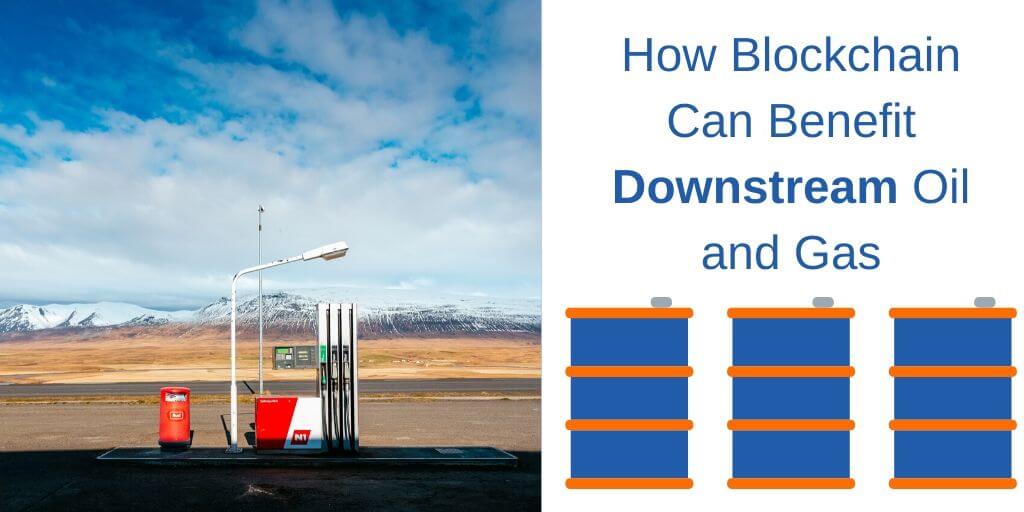
In this series, we’re breaking down how blockchain can impact the complex segments of the oil and gas industry: upstream, midstream, and downstream.
Part 1: Upstream
Part 2: Midstream
As we mentioned in the first part of this series, there are three segments of the oil and gas industry: upstream, midstream, and downstream. After the upstream segment (exploration and production) and midstream segment (transportation and storage), downstream oil and gas includes the process during which businesses transform crude oil into finished products for consumers.
Two types of enterprises work within the downstream segment — Global Integrated Refiners (GIRs) and Independents. While GIRs are corporations that participate in all three segments of oil and gas, Independents only participate in the downstream segment. They are often smaller refining companies that sell products directly to consumers through service stations they own or operate.
For both GIRs and Independents, the downstream segment is consumer-facing, which means that downstream businesses run on a margin-driven economic model. Like in any margin-driven industry, downstream companies try to boost their bottom lines through operational optimization — something in which blockchain technology excels. The more money a downstream business can save by streamlining its operations, the more its profit increases.
Let’s look at the top 3 ways that blockchain can help downstream businesses optimize their bottom lines, from simplifying data management to improving transparency into the supply chain.
Simplify Data Management
The downstream segment is extremely complex. Businesses have to work with distribution networks to get their refined products, and then they have to manage everything from production to marketing. Downstream businesses have to collaborate with many players and manage many products — making downstream oil and gas one of the most convoluted industries out there.
Due to all of these moving parts, companies struggle with data management. Collecting, recording, and sharing data between multiple businesses in a single segment is difficult. To add to the trouble, critical data that should be shared between all three oil and gas segments is often siloed within each segment. When downstream businesses need to access and organize data from upstream or midstream companies, they must complete the legwork by hand — and even then, the data they find is often incomplete.
Currently, few businesses in the oil and gas industry have a central database where they can store key information with the proper security and permissions. But with blockchain technology, businesses can have access to a shared, distributed ledger that provides transparency into all relevant business data. With smart contract integration and permissions, businesses can ensure that data is shared with other parties only when necessary.
Complete confidence in the accuracy of supply chain data allows downstream businesses to create secure automations and leaders to make more informed choices based on verifiable data — resulting in better decisions and higher profit margins.
Streamline Quality Control and Automated Payments
Counterfeiting is a problem in the downstream oil and gas industry. Fake gasoline, diesel additives, or other products can lead downstream businesses to accidentally sell inferior — or even dangerous — products to consumers. The fraudsters that produce these counterfeit items can manipulate quality control records to hide their activity.
With immutable blockchain-based records of everything from production to refinement, bad actors would find it nearly impossible to either hide or change quality control documents.
Another key problem the downstream segment encounters is reconciling payments during fast-paced buy and sell cycles. Currently, the reconciliation process is slow, hampered by back-office inefficiency, manual data entry, and outdated accounting processes.
With the help of blockchain, businesses can expedite reconciliation. Smart contracts empower parties to make real-time payments or apply credit quickly, which reduces the amount of time between making payments and receiving money. Smart contracts can even allow businesses to automate payments, automatically filling in product quantity, timing, and quality. Ultimately, blockchain technology enables downstream businesses to free up their cash flow.
Gain Transparency Into The Supply Chain
Because crude oil is refined into many different products that travel to various destinations, tracking these products along the supply chain is critical for downstream businesses.
However, due to the silos that prevent upstream, midstream, and downstream businesses from collaborating, most downstream businesses don’t have full visibility into their supply chain. Without access to a system that tracks supplies in near real-time, businesses struggle to make accurate decisions and catch mistakes before they happen.
With the help of a reliable ledger shared across various permissioned parties, GIRs and Independents would finally gain insight into where and how their crude oil is being transformed into consumer products.
Full understanding of the supply chain can help businesses make informed decisions — decisions that can ultimately help them boost their bottom lines.
Without the ability to easily record, verify, and share data, downstream businesses are losing money. But with the help of blockchain technology, downstream businesses can better manage their data, improve quality control, and gain transparency into their supply chains. Ultimately, these benefits will help downstream businesses boost their bottom lines.
This wraps up our three-part series taking a deep dive into the impact blockchain can have on the oil and gas supply chain.
If you have any questions about blockchain or want to learn more about Vertrax’s partnership with IBM to bring a blockchain solution to the oil and gas industry, drop us a line.

